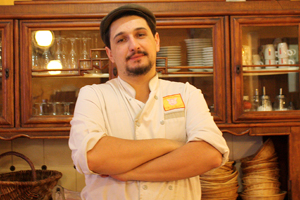 La Tête De Lard requires a bit of effort from its customers. Hidden down a tiny little street like a secret for the initiated only, it’s nevertheless right in the heart of the Presqu’île district!
La Tête De Lard requires a bit of effort from its customers. Hidden down a tiny little street like a secret for the initiated only, it’s nevertheless right in the heart of the Presqu’île district!
Les Bouchons Lyonnais : Can you tell us the names of your chefs and the career paths they followed?
Yoann Blanc : I’ve worked in some renowned restaurants, but for me it just seemed natural to work in the kitchens at La Tête De Lard.
LBL : Why did you decide to open a bouchon-style restaurant (generation, family, etc.)?
YB : I like working in a bouchon! I’m not interested in luxury and putting on airs and graces, the simple pleasures of a friendly, honest restaurant are much more my style.
LBL : Does your bouchon have any specialities or particular culinary style?
YB : My menu includes chitterling sausage in pastry (andouillette en croûte), calf’s tongue in ravigote sauce (langue de veau en ravigote), and home-made quenelles. I also make dishes to order if you book two days in advance.
LBL : What dish would you choose to symbolise bouchon cuisine?
YB : I’d go for calf’s head and breaded tripe (tablier de sapeur).
“A good restaurant owner has to offer good products and a warm welcome, and be ready to give their customers good advice.”
LBL : How would you describe Lyon’s gastronomic heritage?
YB : It’s plain cooking with lots of flavour made using inexpensive produce.
LBL : Apart from the actual cooking, what else is different about genuine Lyon bouchons as opposed to other restaurants?
YB : I think the setting, decor and welcome are all equally important.
LBL : What would you say are the qualities of a good restaurant owner?
YB : They have to offer good products and a warm welcome, and be ready to give their customers good advice.


